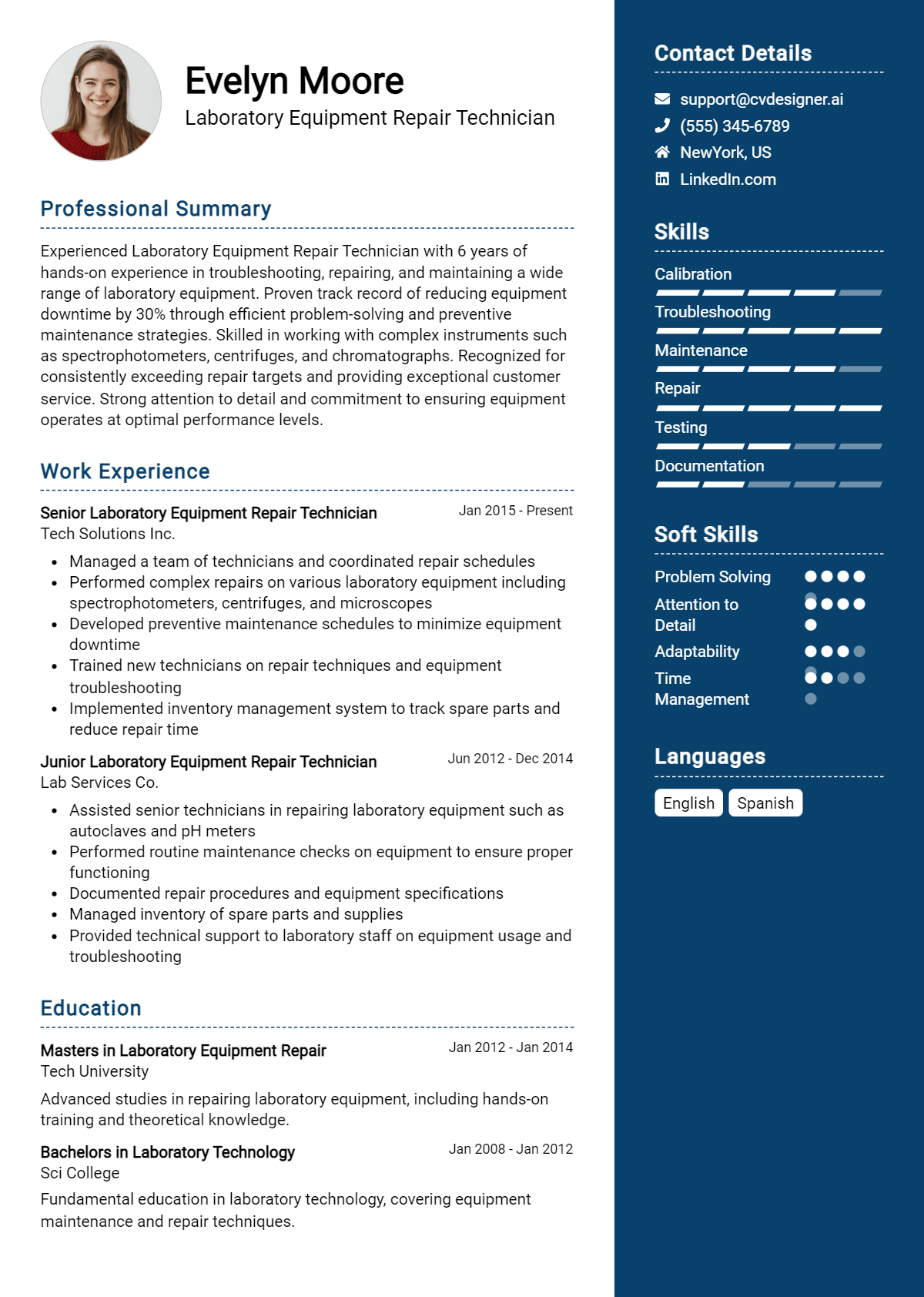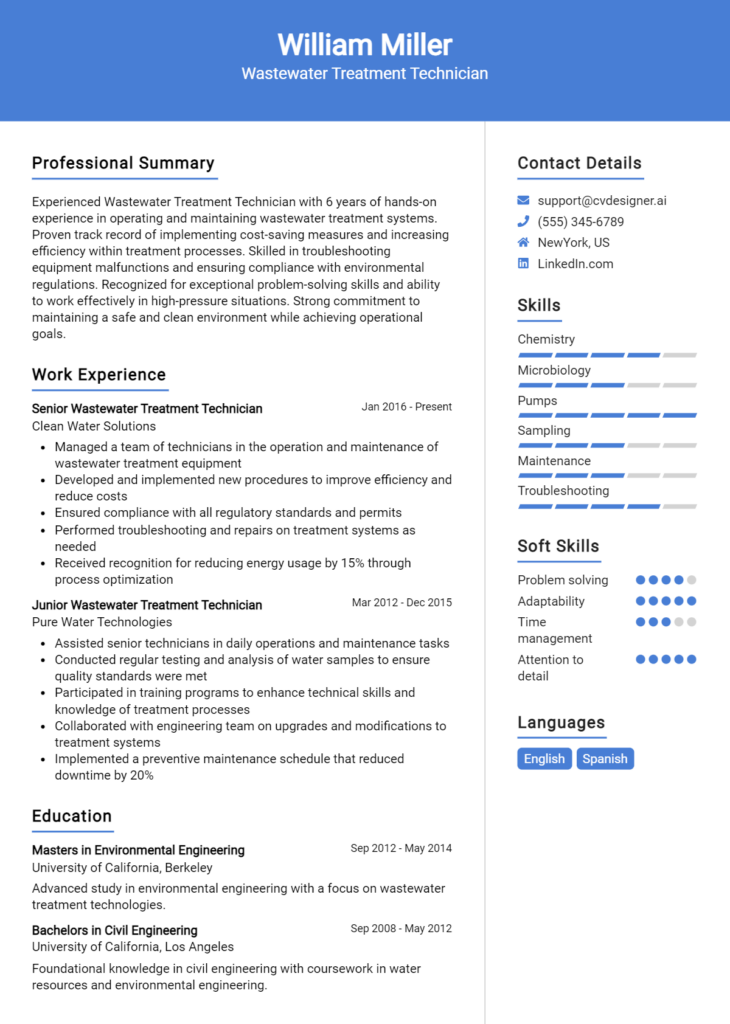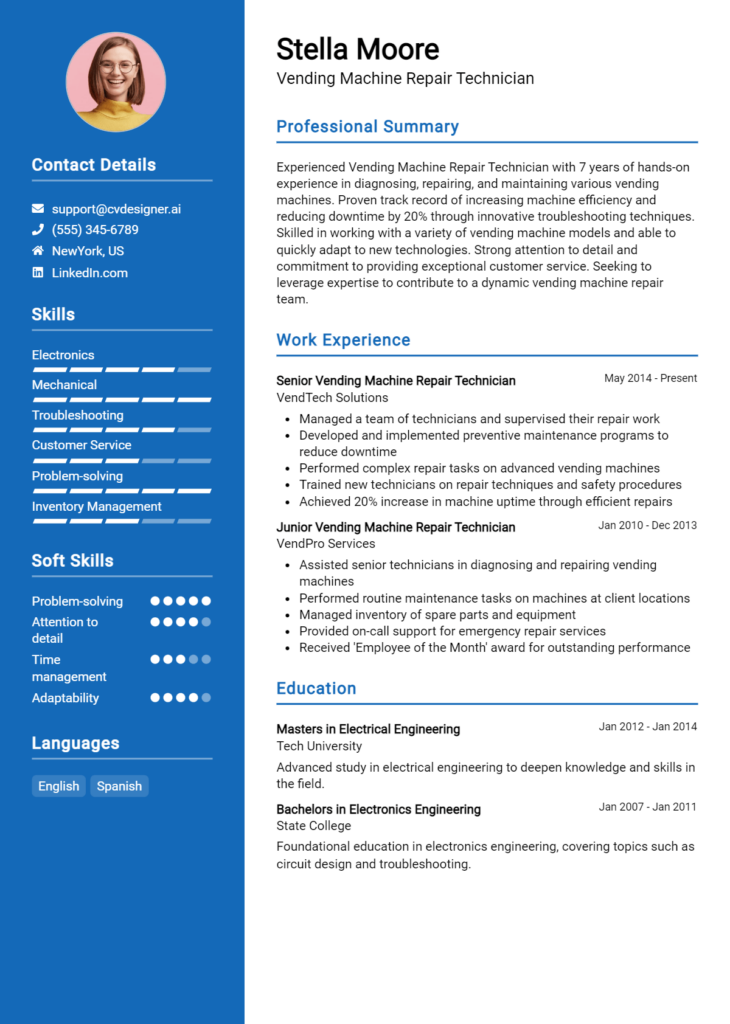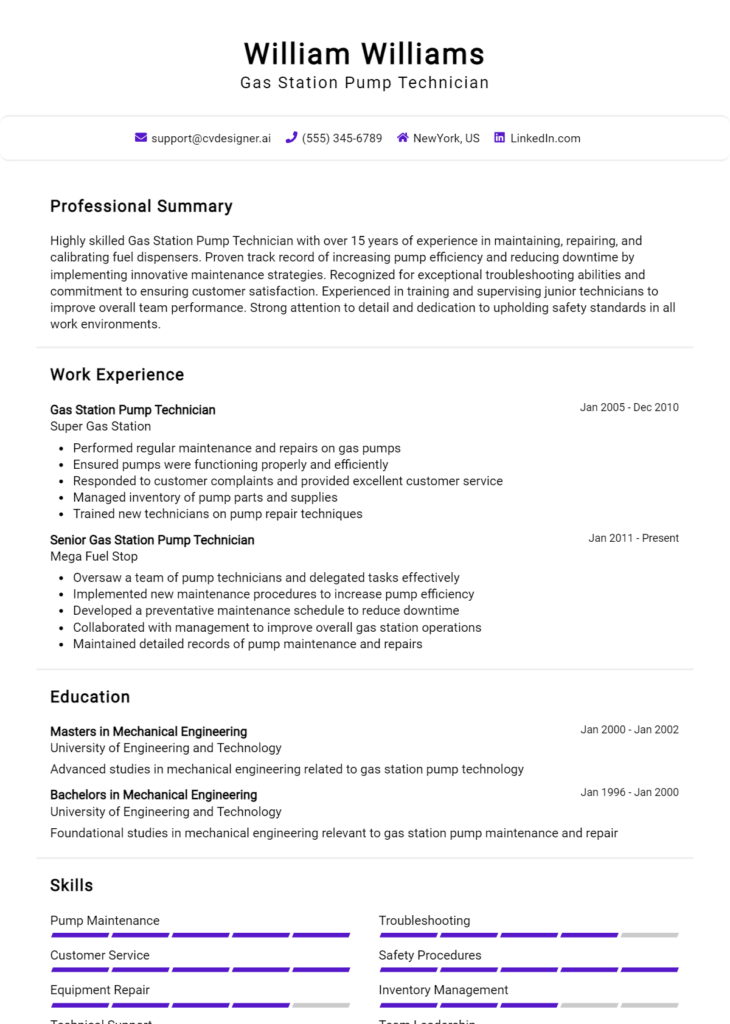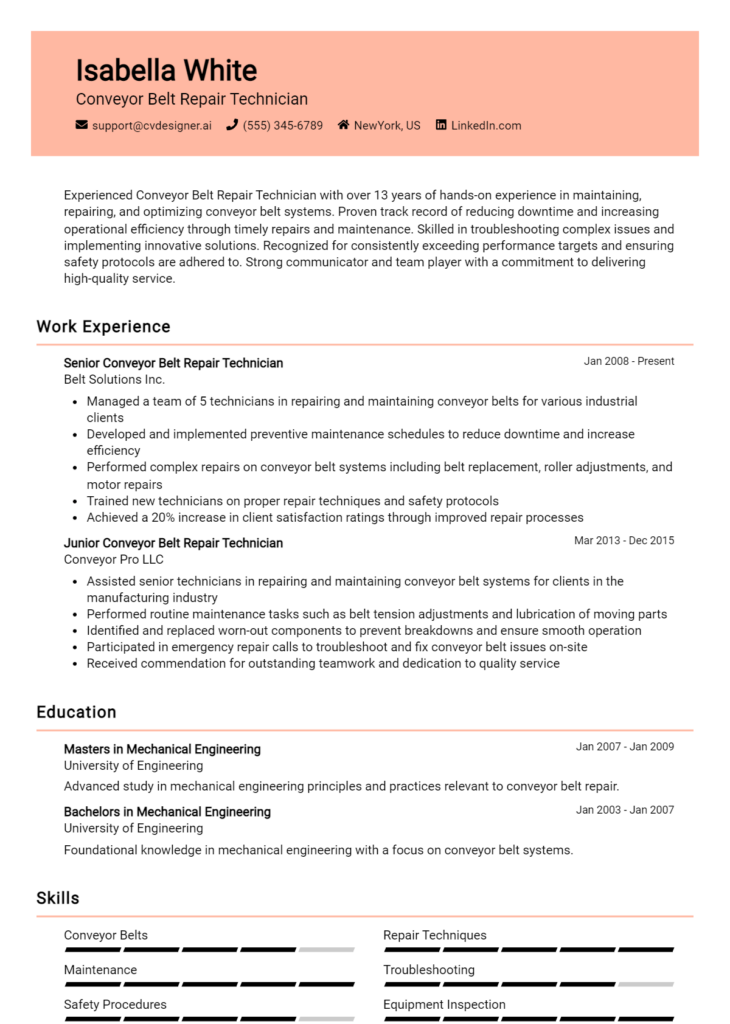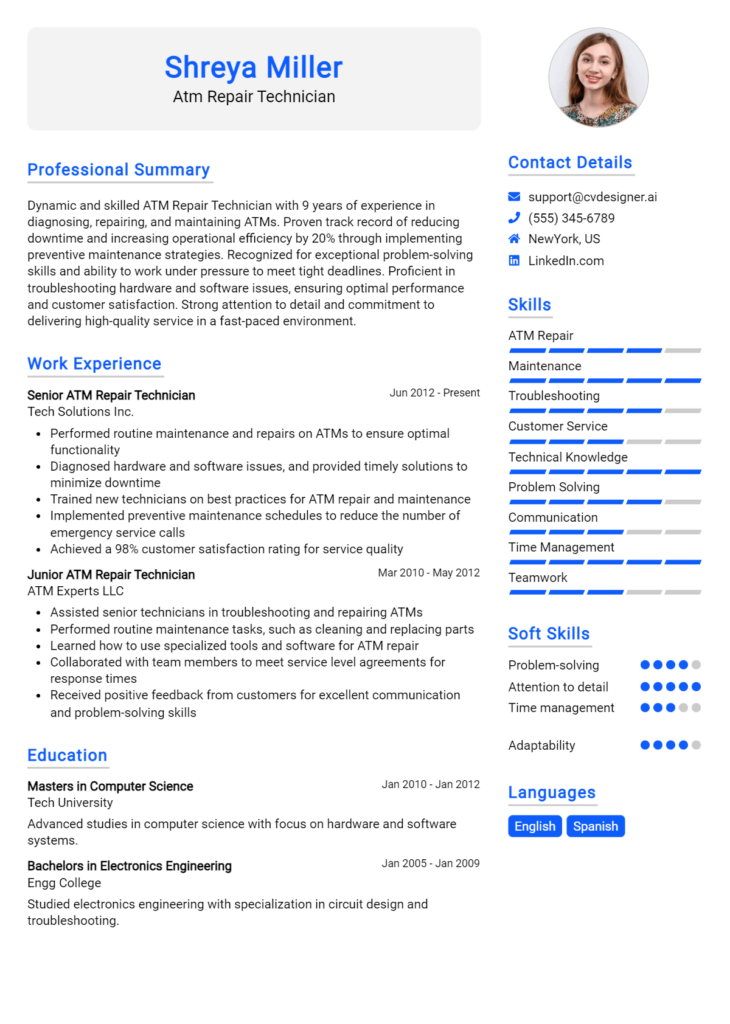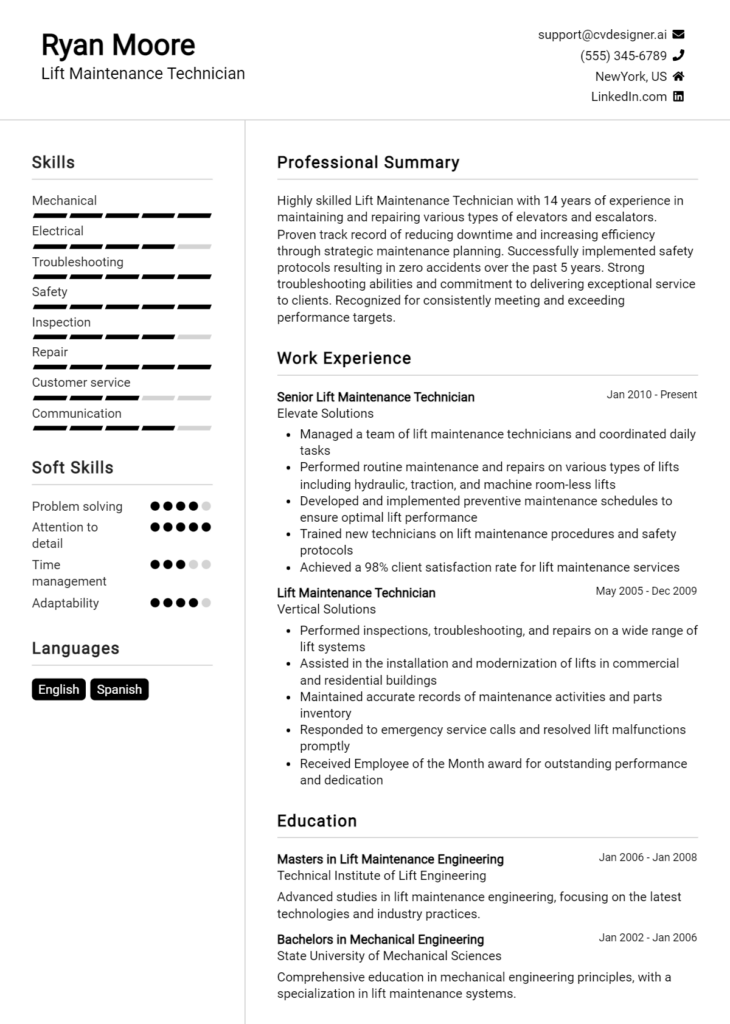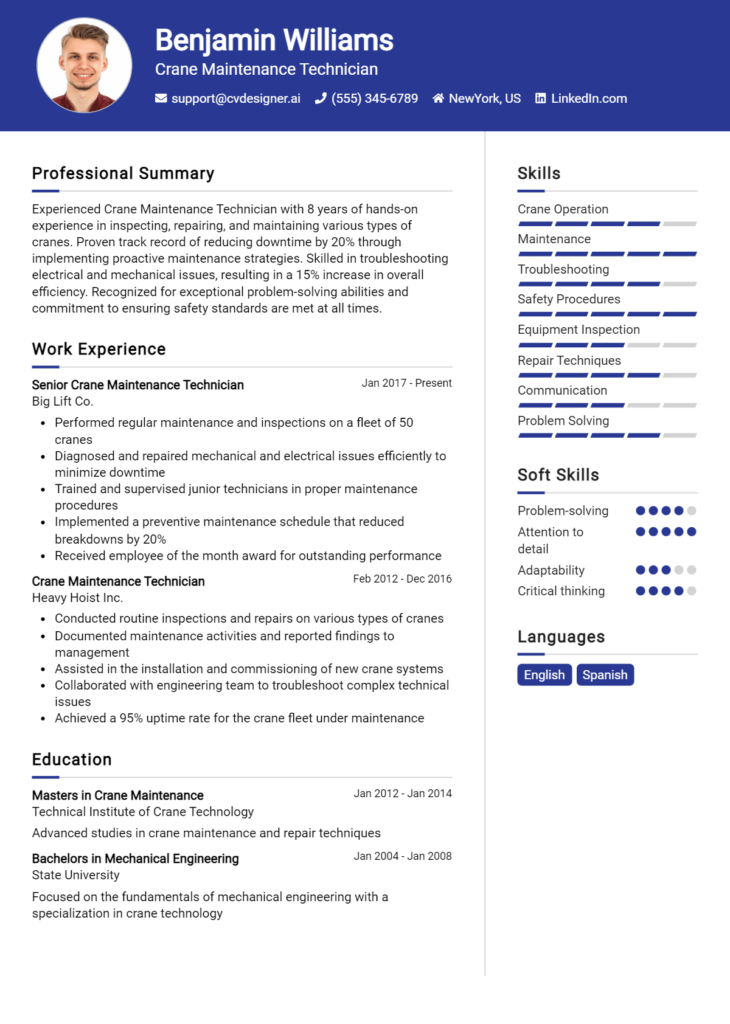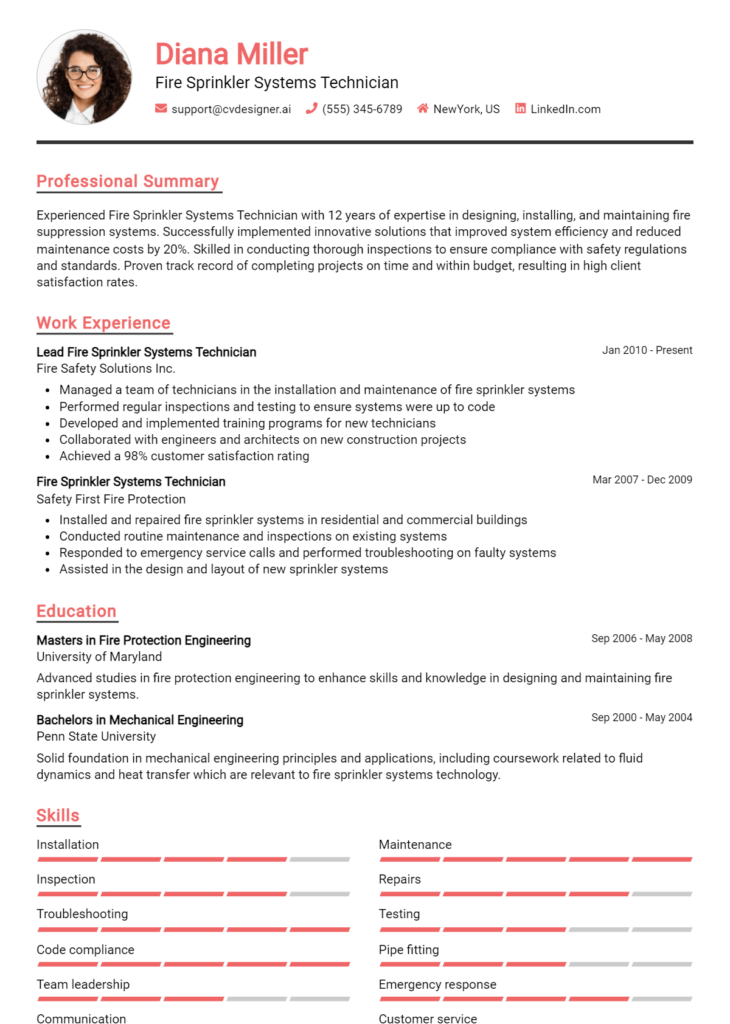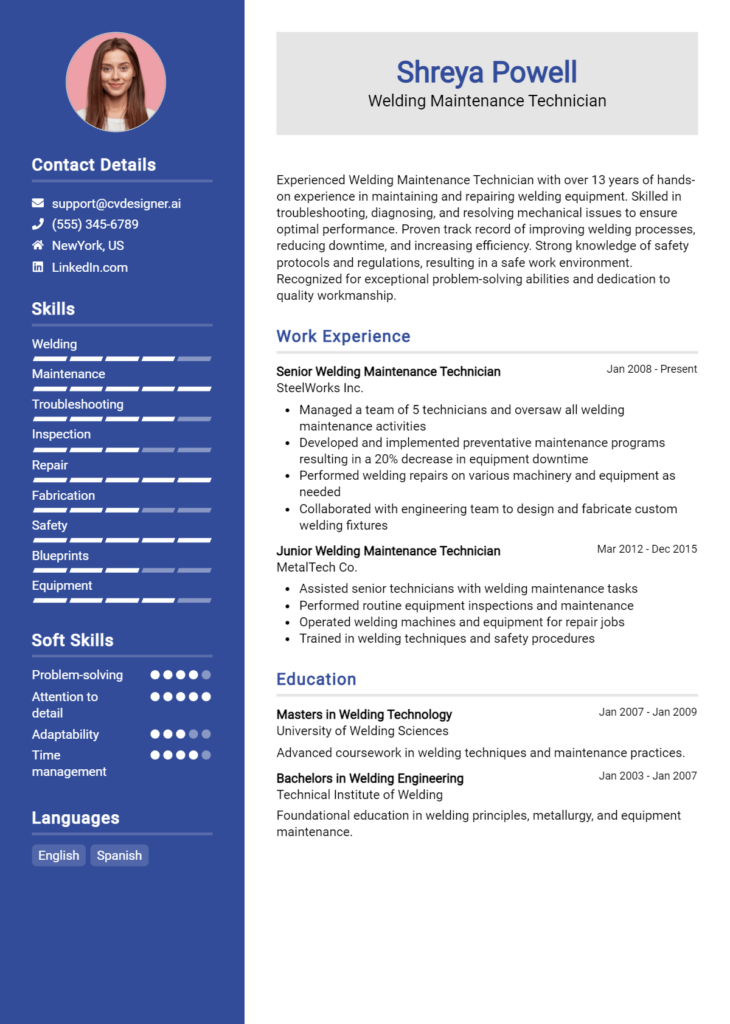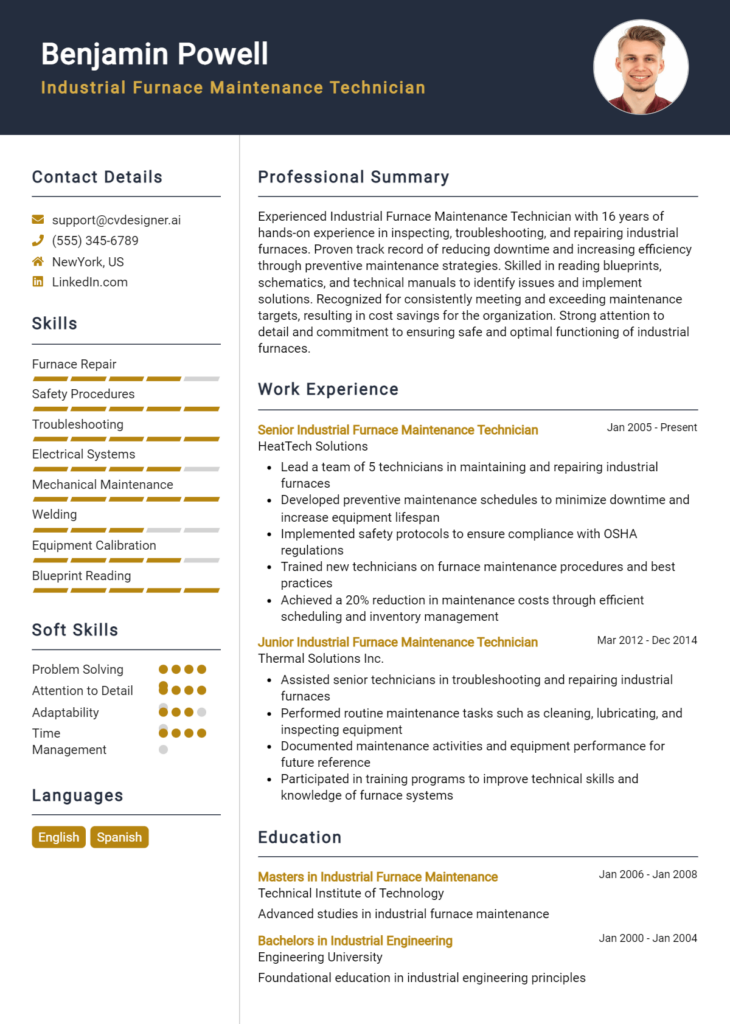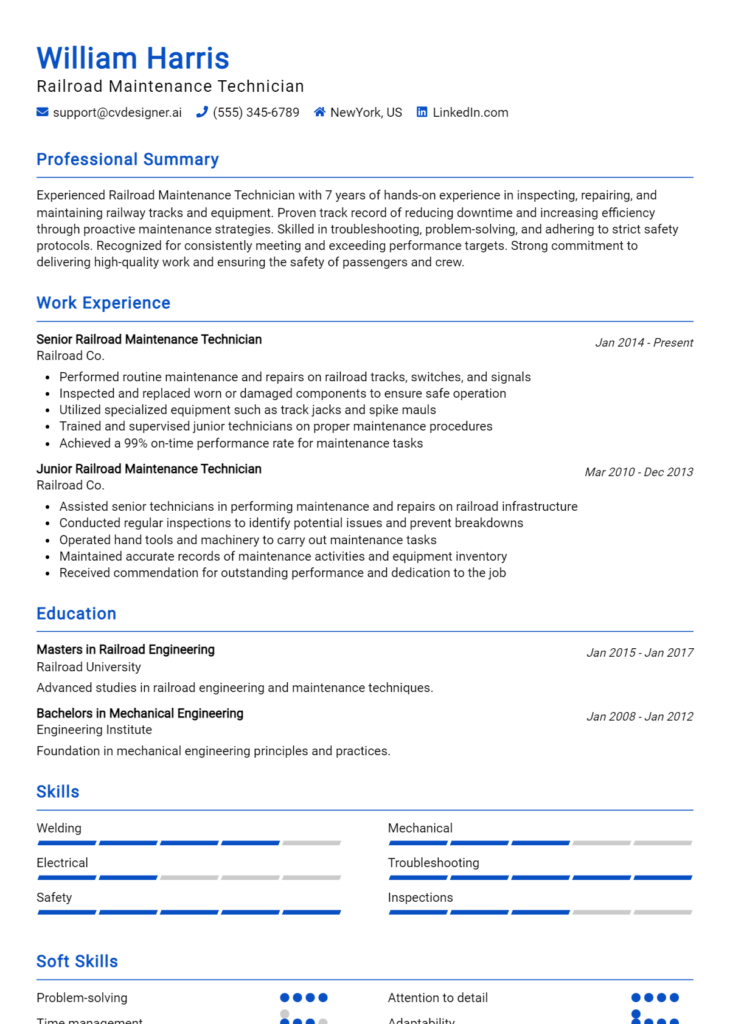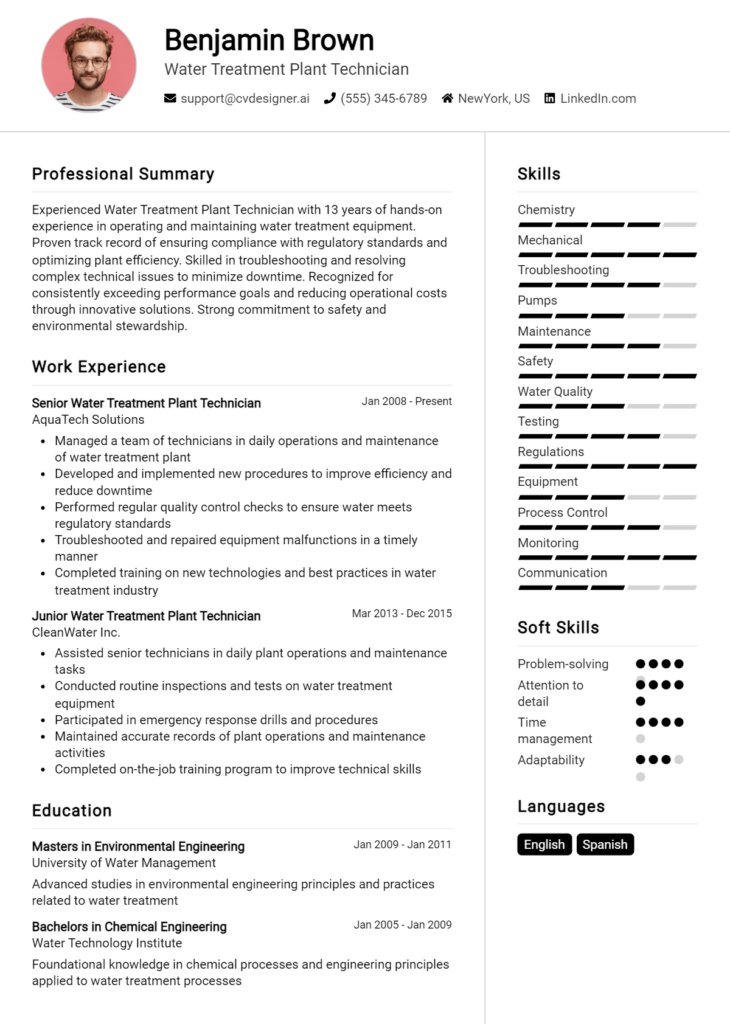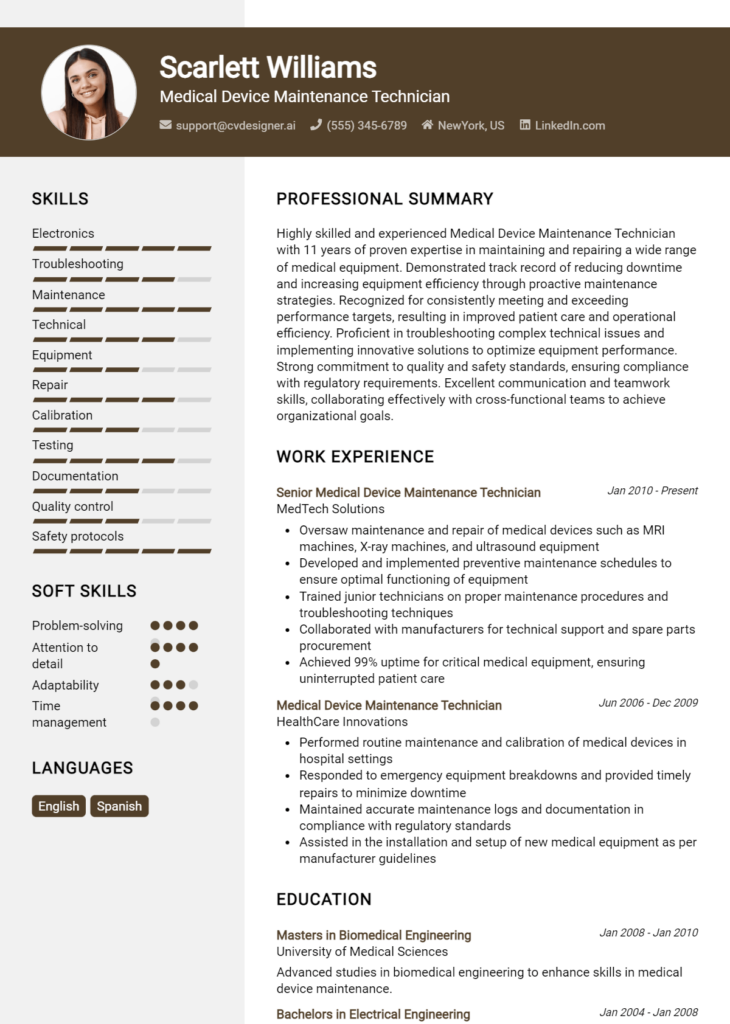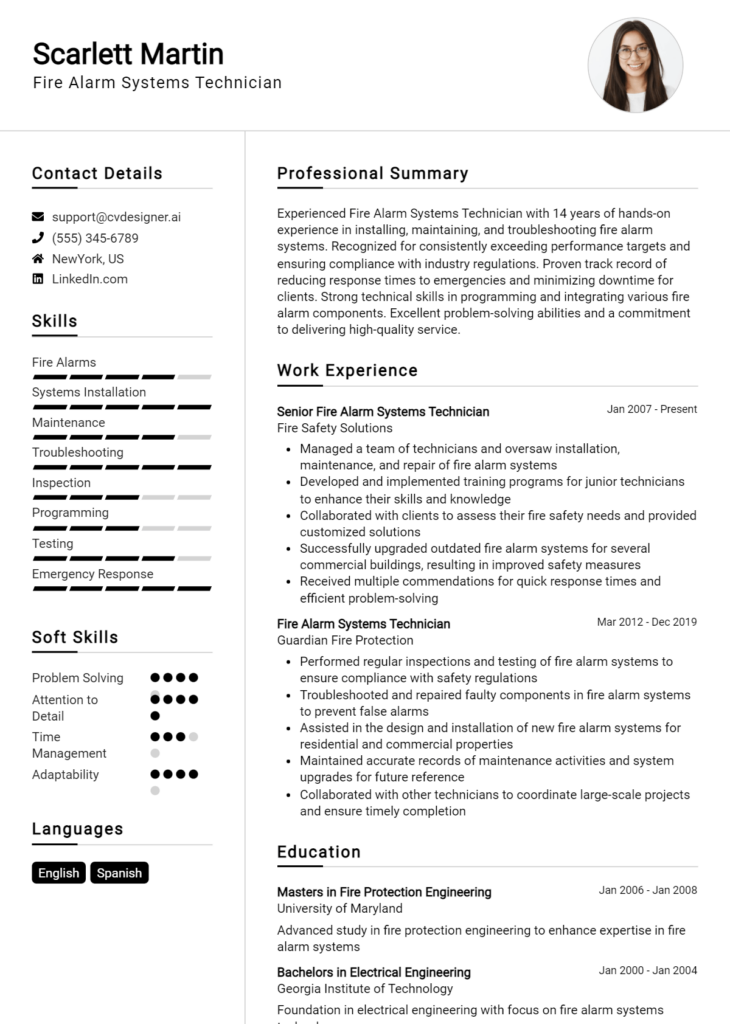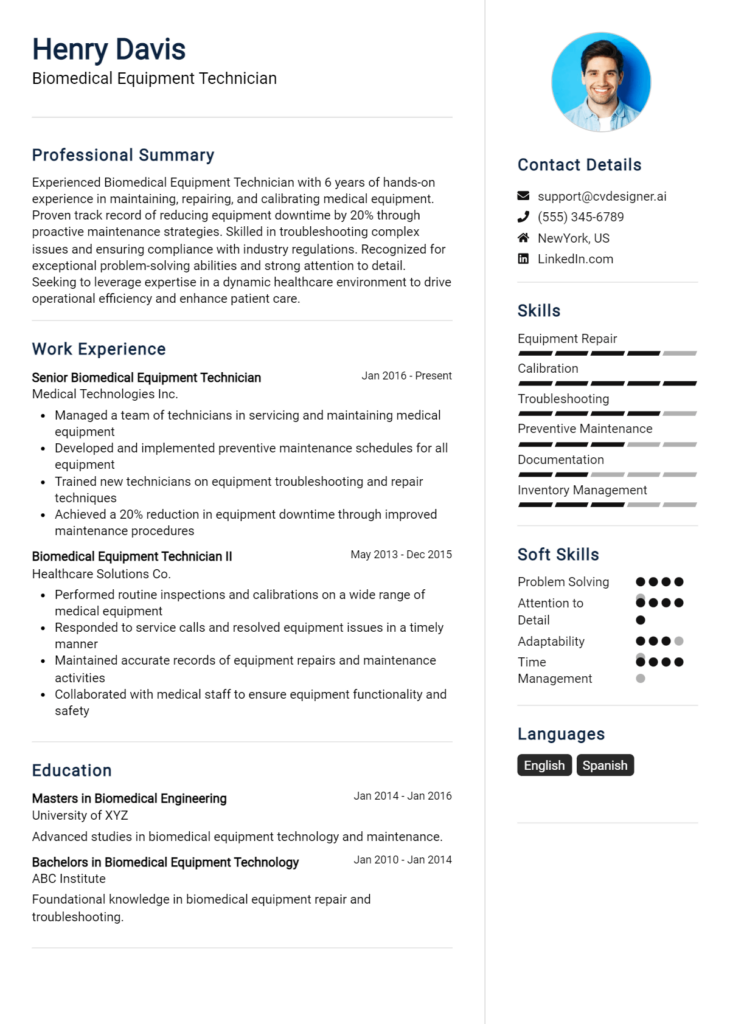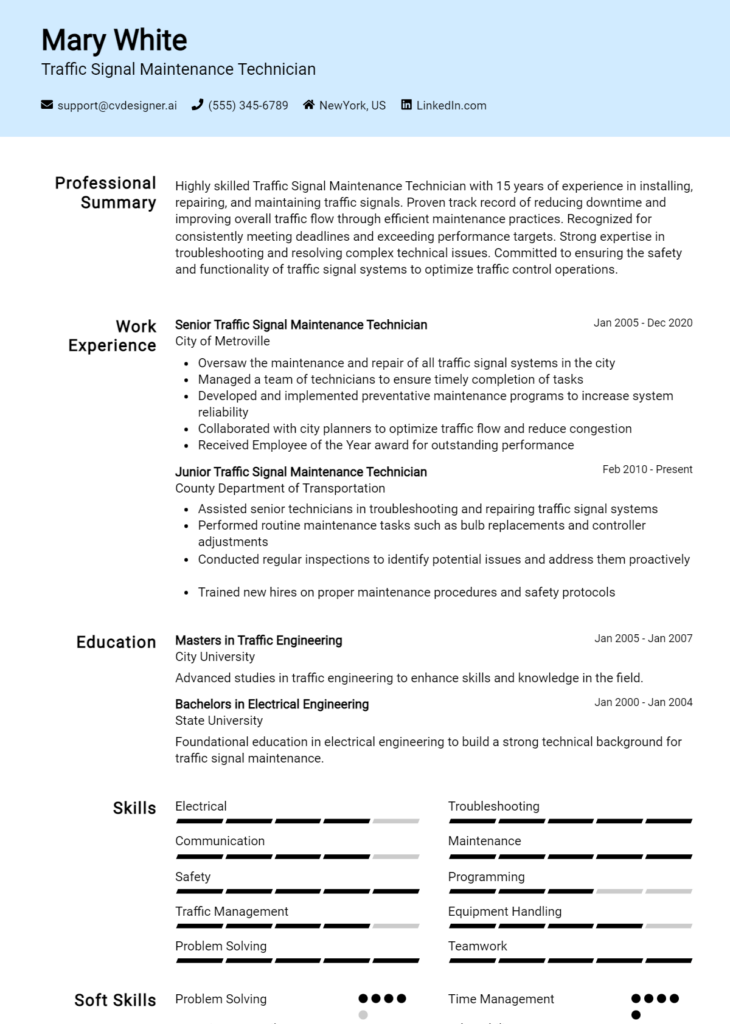Laboratory Equipment Repair Technician Core Responsibilities
A Laboratory Equipment Repair Technician is essential in maintaining the functionality of critical laboratory instruments, ensuring seamless operations across various departments. This role requires technical expertise in diagnosing and repairing equipment, along with strong problem-solving skills to troubleshoot issues efficiently. A successful technician must communicate effectively with scientists and engineers, contributing to research and development goals. A well-structured resume can highlight these technical and operational skills, demonstrating the candidate’s capability to support organizational objectives.
Common Responsibilities Listed on Laboratory Equipment Repair Technician Resume
- Perform routine maintenance and repairs on laboratory instruments and equipment.
- Diagnose equipment malfunctions using technical manuals and diagnostic tools.
- Calibrate and validate laboratory equipment to ensure accurate performance.
- Maintain accurate records of repairs, maintenance, and inventory.
- Collaborate with scientists and engineers to understand equipment specifications.
- Train laboratory staff on proper equipment usage and maintenance protocols.
- Develop and implement preventive maintenance schedules.
- Order replacement parts and maintain inventory of equipment supplies.
- Ensure compliance with safety and regulatory standards.
- Assist in the installation and commissioning of new laboratory equipment.
- Stay updated on advancements in laboratory technology and repair techniques.
High-Level Resume Tips for Laboratory Equipment Repair Technician Professionals
In the competitive field of laboratory equipment repair, a well-crafted resume serves as a crucial tool for professionals seeking to make a strong impression on potential employers. As the first point of contact between candidates and hiring managers, your resume needs to effectively showcase your skills, experiences, and achievements in a way that aligns with the specific demands of the role. A strategically designed resume not only highlights your technical expertise but also demonstrates your problem-solving capabilities and your understanding of the industry. This guide aims to provide practical and actionable resume tips specifically tailored for Laboratory Equipment Repair Technician professionals, enabling you to present your qualifications in the best light possible.
Top Resume Tips for Laboratory Equipment Repair Technician Professionals
- Tailor your resume to match the job description by using keywords and phrases from the posting.
- Begin with a strong summary statement that encapsulates your experience and what you bring to the role.
- Highlight relevant certifications, such as those in equipment repair or safety standards, prominently.
- Showcase your technical skills, focusing on laboratory equipment types you have experience with (e.g., centrifuges, spectrophotometers).
- Quantify your achievements by including specific metrics, such as the number of repairs completed or reduction in downtime.
- Include a section on troubleshooting expertise, emphasizing your ability to diagnose and resolve equipment issues effectively.
- Detail your professional experience chronologically, ensuring that you emphasize roles that are most relevant to laboratory equipment repair.
- Incorporate soft skills such as communication, teamwork, and attention to detail, as these are critical in a collaborative lab environment.
- Keep formatting clean and professional, using bullet points for easy readability and ensuring consistency throughout the document.
- Proofread your resume thoroughly to avoid any errors, as mistakes can detract from your professionalism and attention to detail.
By implementing these tips, you can significantly enhance your resume's effectiveness, ultimately increasing your chances of landing a job in the Laboratory Equipment Repair Technician field. A well-structured and targeted resume not only captures the attention of hiring managers but also clearly communicates your qualifications, making you a standout candidate in a competitive job market.
Why Resume Headlines & Titles are Important for Laboratory Equipment Repair Technician
When applying for a position as a Laboratory Equipment Repair Technician, the importance of a compelling resume headline or title cannot be overstated. A well-crafted headline serves as the first impression a hiring manager will have of a candidate, making it crucial to capture their attention immediately. A strong headline succinctly summarizes a candidate’s key qualifications and aligns them with the specific job requirements, showcasing their suitability for the role. In a competitive job market, an impactful phrase can set an applicant apart, ensuring their resume stands out amidst numerous others. Therefore, the headline should be concise, relevant, and directly related to the Laboratory Equipment Repair Technician position.
Best Practices for Crafting Resume Headlines for Laboratory Equipment Repair Technician
- Keep it concise: Aim for no more than 10-12 words.
- Be role-specific: Use keywords that directly relate to the Laboratory Equipment Repair Technician position.
- Highlight key skills: Incorporate your most relevant expertise or certifications.
- Showcase experience: Mention years of experience or specific accomplishments.
- Use action-oriented language: Start with strong verbs that convey your capability.
- Tailor for the job: Customize your headline for each application to reflect the job description.
- Avoid jargon: Use clear language that is easy to understand by any hiring manager.
- Make it compelling: Use adjectives that convey confidence and professionalism.
Example Resume Headlines for Laboratory Equipment Repair Technician
Strong Resume Headlines
"Experienced Laboratory Equipment Repair Technician with 5+ Years in Precision Instrumentation"
“Certified Biomedical Equipment Technician Specializing in Diagnostic Imaging Systems”
“Proficient in Laboratory Equipment Calibration and Maintenance with Proven Track Record”
Weak Resume Headlines
“Looking for a Job in Equipment Repair”
“Technician with Experience”
The strong headlines are effective because they immediately communicate specific qualifications and expertise relevant to the Laboratory Equipment Repair Technician role. They provide a clear picture of the candidate's experience and skills, which can entice hiring managers to read further. In contrast, the weak headlines fail to impress due to their vagueness and lack of specificity. They do not highlight any particular strengths or relevant experience, making it difficult for hiring managers to recognize the candidate's potential fit for the role.
Writing an Exceptional Laboratory Equipment Repair Technician Resume Summary
A resume summary is a crucial element for a Laboratory Equipment Repair Technician, as it serves as the candidate's first impression on hiring managers. A strong summary quickly captures attention by showcasing key skills, relevant experience, and notable accomplishments that align with the job role. It should be concise, impactful, and tailored specifically to the position being applied for, ensuring that it highlights the technician's ability to troubleshoot, repair, and maintain complex laboratory equipment effectively.
Best Practices for Writing a Laboratory Equipment Repair Technician Resume Summary
- Quantify Achievements: Use specific numbers or metrics to highlight your accomplishments, such as reducing repair times or improving equipment efficiency.
- Focus on Relevant Skills: Emphasize technical skills and knowledge pertinent to laboratory equipment, including specific repair techniques and familiarity with various devices.
- Tailor for the Job Description: Align your summary with the specific requirements and responsibilities listed in the job posting to demonstrate fit.
- Use Action Verbs: Start sentences with powerful action verbs to convey your proactive approach and impact in previous roles.
- Highlight Certifications: If applicable, mention any relevant certifications or training that sets you apart from other candidates.
- Be Concise: Keep your summary brief—ideally 2-4 sentences—to maintain the hiring manager's attention.
- Showcase Problem-Solving Skills: Mention instances of troubleshooting or complex problem-solving that illustrate your capability in handling equipment malfunctions.
- Include Soft Skills: Incorporate relevant soft skills such as communication, teamwork, and attention to detail that are essential for collaborating in a laboratory environment.
Example Laboratory Equipment Repair Technician Resume Summaries
Strong Resume Summaries
Detail-oriented Laboratory Equipment Repair Technician with over 5 years of experience in diagnosing and repairing complex laboratory instruments. Successfully reduced average repair turnaround time by 30% while maintaining a 95% customer satisfaction rate.
Certified Laboratory Equipment Technician with extensive knowledge of electronic and mechanical systems. Achieved a 20% increase in equipment uptime through proactive maintenance strategies and effective troubleshooting.
Results-driven technician specializing in laboratory equipment maintenance, with expertise in chromatography and spectrometry systems. Instrumental in implementing a new tracking system that improved inventory management, leading to a 15% cost reduction.
Weak Resume Summaries
Experienced technician looking for a job in laboratory equipment repair. I have worked on various types of equipment and am familiar with basic repairs.
Laboratory Equipment Repair Technician with some experience. I can fix things and help teams with equipment issues.
The examples provided illustrate the key differences between strong and weak resume summaries. Strong summaries are characterized by specific achievements, quantifiable results, and relevant skills that directly relate to the role, demonstrating the candidate's value and expertise. In contrast, weak summaries lack detail, fail to highlight measurable outcomes, and appear too generic, which diminishes their impact and effectiveness in capturing the hiring manager's attention.
Work Experience Section for Laboratory Equipment Repair Technician Resume
The work experience section of a Laboratory Equipment Repair Technician resume is crucial as it provides potential employers with insight into the candidate's technical skills and hands-on experience. This section not only highlights the applicant's proficiency in repairing and maintaining laboratory equipment but also showcases their ability to manage teams and ensure the delivery of high-quality products. By quantifying achievements and aligning experiences with industry standards, candidates can demonstrate their value and effectiveness in previous roles, making a compelling case for their candidacy.
Best Practices for Laboratory Equipment Repair Technician Work Experience
- Emphasize relevant technical skills specific to laboratory equipment repair and maintenance.
- Quantify achievements with metrics, such as reduced downtime percentages or cost savings.
- Highlight instances of collaboration with cross-functional teams, showcasing teamwork and communication.
- Use industry-standard terminology to align your experience with potential employer expectations.
- Detail specific projects or tasks that demonstrate leadership and initiative in problem-solving.
- Include certifications or training that enhance your qualifications in the field.
- Focus on results-driven statements that illustrate your impact on previous employers.
- Tailor your experiences to match the job description of the position you are applying for.
Example Work Experiences for Laboratory Equipment Repair Technician
Strong Experiences
- Successfully led a team of 5 technicians in a laboratory equipment overhaul project, resulting in a 30% reduction in equipment failure rates and a 15% increase in operational efficiency.
- Implemented a preventive maintenance program that decreased equipment downtime by 40%, saving the department $25,000 annually.
- Collaborated with laboratory staff to redesign the equipment maintenance schedule, improving service response time by 50% and enhancing user satisfaction.
- Trained and mentored junior technicians on advanced repair techniques, leading to a 20% increase in overall team productivity and skill competency.
Weak Experiences
- Worked on various laboratory equipment repairs without specifying the types or methods used.
- Assisted in maintenance tasks as needed, contributing to team efforts.
- Performed regular checks on equipment.
- Helped with equipment issues occasionally, but did not measure the outcomes or impacts of those efforts.
The examples provided illustrate the difference between strong and weak experiences. Strong experiences are characterized by specific, quantifiable outcomes and details that showcase leadership, collaboration, and technical expertise. In contrast, weak experiences tend to be vague and lack measurable results, making it difficult for potential employers to gauge the candidate's true capabilities and contributions in previous roles.
Education and Certifications Section for Laboratory Equipment Repair Technician Resume
The education and certifications section of a Laboratory Equipment Repair Technician resume is crucial as it serves to showcase the candidate's academic achievements, industry-relevant certifications, and commitment to continuous learning. This section not only highlights the foundational knowledge and technical skills acquired through formal education but also emphasizes specialized training and certifications that are highly regarded in the industry. By providing relevant coursework, certifications, and any specialized training, candidates can significantly enhance their credibility and demonstrate their alignment with the job requirements, ultimately making them more attractive to potential employers.
Best Practices for Laboratory Equipment Repair Technician Education and Certifications
- Prioritize relevant degrees and certifications that directly relate to laboratory equipment repair.
- Include specific coursework that demonstrates hands-on experience with laboratory technologies.
- Highlight advanced or industry-recognized certifications, such as those from reputable organizations.
- Keep the information current by removing outdated qualifications and certifications.
- Use clear and concise language to describe the significance of each credential.
- Incorporate any continuing education courses or workshops relevant to the field.
- Consider including honors or distinctions received during academic or training programs.
- Align the listed qualifications with the specific job description to enhance relevance.
Example Education and Certifications for Laboratory Equipment Repair Technician
Strong Examples
- Bachelor of Science in Biomedical Engineering, XYZ University, 2020
- Certified Laboratory Technician (CLT), National Certification Board, 2021
- Coursework in Instrumentation and Measurement Techniques, XYZ University
- Hands-on training in Laboratory Equipment Maintenance, ABC Training Institute, 2022
Weak Examples
- Associate Degree in General Studies, ABC Community College, 2015
- Certification in Office Software Applications, 2020
- High School Diploma, 2010
- Outdated certification in Basic Electronics from 2010
The strong examples are considered effective because they directly relate to the technical skills and knowledge required for a Laboratory Equipment Repair Technician, showcasing relevant degrees and certifications that are recognized in the industry. In contrast, the weak examples illustrate irrelevant or outdated qualifications that do not support the candidate’s suitability for the role, such as general studies or certifications unrelated to laboratory equipment repair. By focusing on current and relevant credentials, candidates can better position themselves for success in their job search.
Top Skills & Keywords for Laboratory Equipment Repair Technician Resume
In the competitive field of laboratory equipment repair, having the right skills is essential for standing out to potential employers. A well-crafted resume that highlights both hard and soft skills not only showcases your technical abilities but also demonstrates your problem-solving capabilities and interpersonal strengths. These skills ensure that you can effectively troubleshoot issues, communicate with team members, and maintain a high standard of safety and efficiency in the laboratory environment. Therefore, incorporating a comprehensive list of relevant skills in your resume can significantly enhance your chances of landing the job.
Top Hard & Soft Skills for Laboratory Equipment Repair Technician
Soft Skills
- Attention to Detail
- Problem-Solving
- Communication Skills
- Team Collaboration
- Time Management
- Adaptability
- Customer Service Orientation
- Critical Thinking
- Organization Skills
- Reliability
Hard Skills
- Proficiency in Laboratory Equipment Repair
- Electrical Troubleshooting
- Knowledge of Calibration Procedures
- Familiarity with Safety Protocols
- Mechanical Aptitude
- Proficient in Diagnostic Tools
- Understanding of Laboratory Standards (GLP, GMP)
- Experience with Preventive Maintenance
- Ability to Read Technical Schematics
- Software Proficiency (e.g., maintenance management systems)
By emphasizing these skills on your resume, combined with solid work experience, you can present a compelling case for your candidacy as a Laboratory Equipment Repair Technician.
Stand Out with a Winning Laboratory Equipment Repair Technician Cover Letter
Dear [Hiring Manager's Name],
I am writing to express my interest in the Laboratory Equipment Repair Technician position at [Company Name], as advertised on [Job Board/Company Website]. With a solid background in mechanical and electronic repair, combined with hands-on experience in laboratory environments, I am confident in my ability to contribute effectively to your team. My technical skills, attention to detail, and commitment to maintaining high operational standards have equipped me to excel in ensuring the reliability and functionality of laboratory equipment.
In my previous role at [Previous Company Name], I successfully diagnosed and repaired a wide range of laboratory instruments, including centrifuges, spectrophotometers, and incubators. My responsibilities involved performing routine maintenance, troubleshooting unexpected breakdowns, and collaborating with scientists to understand their specific equipment needs. This experience has not only honed my technical abilities but has also fostered strong communication skills, allowing me to convey complex technical information clearly and effectively.
I am particularly drawn to [Company Name] because of your commitment to innovation and quality in laboratory practices. I am eager to bring my proactive approach and problem-solving skills to your esteemed organization. I am also committed to continuous learning, and I actively seek opportunities to stay updated on the latest technologies and repair techniques in the industry. I am excited about the possibility of contributing to your team and supporting your mission to advance scientific research.
Thank you for considering my application. I look forward to the opportunity to discuss how my skills and experiences align with the needs of your team at [Company Name]. I am available for an interview at your earliest convenience and can be reached at [Your Phone Number] or [Your Email Address].
Sincerely,
[Your Name]
[Your LinkedIn Profile or Portfolio URL, if applicable]
Common Mistakes to Avoid in a Laboratory Equipment Repair Technician Resume
Crafting a resume for a Laboratory Equipment Repair Technician requires careful attention to detail, as this role demands technical skills and practical experience. However, many candidates make common mistakes that can hinder their chances of landing an interview. By avoiding these pitfalls, you can create a more compelling resume that effectively showcases your qualifications and expertise in laboratory equipment maintenance and repair.
Neglecting Relevant Skills: Failing to highlight specific technical skills related to laboratory equipment repair can make your resume less competitive. Be sure to include skills like troubleshooting, calibration, and knowledge of safety protocols.
Using Vague Job Descriptions: Generic job descriptions that lack detail do not adequately convey your experience. Provide specific examples of equipment you have repaired or maintained, along with quantifiable achievements.
Ignoring Certifications: Not mentioning relevant certifications can be a missed opportunity to demonstrate your qualifications. Include any certifications or training programs related to laboratory equipment and safety.
Inconsistent Formatting: A poorly formatted resume can detract from your professionalism. Use consistent fonts, bullet points, and headings to ensure your resume is easy to read and visually appealing.
Overloading with Technical Jargon: While technical language is important, overusing jargon can alienate hiring managers who may not be familiar with every term. Strive for a balance that communicates expertise without being overly complex.
Omitting Soft Skills: Focusing solely on technical skills may lead to neglecting essential soft skills such as communication, teamwork, and problem-solving. Highlight these skills to show that you can work effectively in a lab environment.
Failing to Tailor the Resume: Sending out a one-size-fits-all resume can weaken your application. Tailor your resume to each job description, emphasizing the most relevant experiences and skills for that specific position.
Skipping Proofreading: Typos and grammatical errors can undermine your credibility. Take the time to proofread your resume carefully, or ask a peer to review it for a fresh perspective.
Conclusion
As a Laboratory Equipment Repair Technician, you play a crucial role in ensuring that laboratory instruments and equipment function optimally. Your expertise not only supports scientific research but also upholds safety standards in various laboratory settings. Throughout this article, we explored the essential skills required for this position, including technical proficiency, problem-solving abilities, and attention to detail. We also highlighted the importance of effective communication and teamwork in a laboratory environment.
Now that you have a clear understanding of the responsibilities and skills needed for a Laboratory Equipment Repair Technician, it’s time to focus on your resume. A well-crafted resume can make a significant difference in your job search, showcasing your qualifications and experiences to potential employers.
Take a moment to review your Laboratory Equipment Repair Technician resume and ensure it reflects your skills and achievements accurately. To assist you in this process, consider utilizing resources such as resume templates, a resume builder, and resume examples tailored specifically for your field. Additionally, don’t overlook the importance of a compelling first impression with a polished cover letter template.
Enhance your job application today and take the next step towards securing your desired position in the laboratory equipment repair field!

